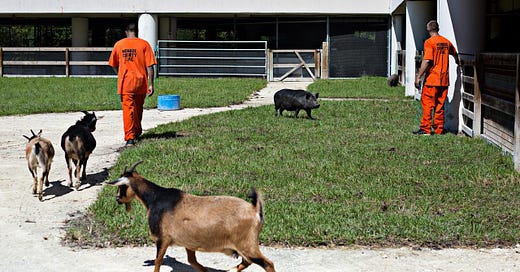Inside an Exotic Zoo—In a Florida Jail
America’s most unique detention center is found on a remote stretch of Key West, where abandoned alpacas, ostracized ostriches and a beloved blind horse are lovingly cared for by inmates.

Photos by Kim Raff
Mike Smith was out of prison for ten days when he blacked out while drinking and was arrested alongside a busy street in Key West. When he sobered up, he was back in jail and had no recollection of being arrested. By his own admission, he was not surprised to be there. This kind of thing had happened before.
“I’m done,” Smith told himself. “If I don’t stop I’m gonna spend the rest of my life in prison.”
This time Smith knew he would have to do a small stint behind bars before he could get a spot in a substance abuse program. In the interim he signed up to be a trustee at the jail and landed the highly coveted job of working on the farm.
For the past two decades abandoned, abused, confiscated and donated animals from around the country have found refugee behind razor wire at the Monroe County Sheriff’s Office Stock Island Detention Center. It’s a place where a miniature horse named “Bam Bam” grazes his days away on a pasture, as men in orange jumpsuits muck stalls and ma…
Keep reading with a 7-day free trial
Subscribe to Narratively to keep reading this post and get 7 days of free access to the full post archives.



